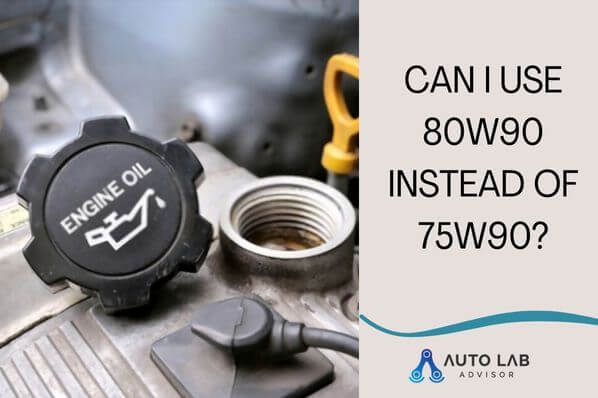Gear oil plays a vital role in decreasing friction of the internal components. There are three types of oil available in the market, such as – Synthetic, Semi-synthetic & Mineral oil. Synthetic oil costs the most & mineral costs the least.
If you’re confused between SAE 75W90 & SAE 80W90, this article is for you. I’ll be explaining if you can use 80W90 instead of 75W90. Later in this article, you’ll know the differences between 80W90 & 75W90.
Quick Answer: Here’s my short answer, in case you don’t have time to read the entire article – “Yes, you can use 80W90 instead of 75W90. You may or may not notice the 1% to 2% performance difference & that’s it“

SAE 75W90 Vs SAE 80W90: In-Depth Oil Comparison
The basic difference between 75W90 & 80W90 is that 75W90 is fully synthetic oil, whereas 80W90 is mineral oil. In this segment, I will demonstrate all other factors that differentiate these two oil types.
Viscosity Level
The viscosity is measured by the weight classification of SAE (Society Of Automotive Engineers). Your car will need different types of SAE Grade oil depending on the weather conditions.
If you don’t change the oil in very hot or cold weather, your gear oil may become thin & it can cause oil pressure to drop. However, using a multi-grade viscous oil will save you from the season-wise oil changing hassle.
Returning to our comparison, both SAE 75W90 & SAE 80W90 are multi-grade gear oils. This means you can use both of these oils in winter & summer simultaneously.
However, the 75W90 is more viscous than 80W90 & which is why you can have a smoother experience with the 75W90 oil round the year.
Winner: 75W90 is The Winner.
Operating Temperature
Every type of oil comes with a usage range where it performs the best without burning out. This temperature issue draws the biggest line between 75W90 & 80W90 oil.
The SAE 75W90 performs great from Minus (–) 40°F to 350° F. Whereas the SAE 80W90 performs great from Minus (–) 20°F to 400°F.
That being said, if you belong to an icy place – you should get the 75W90 oil. Otherwise, the SAE 80W90 will perform just fine in both winter & summer conditions.
Winner: It’s a tie as both of the oil are excellent in their places.
Additive Properties
Additive engine oil properties help reduce friction between components, saving them from accelerated wear & tear.
Both SAE 75W90 & SAE 80W90 oil come with good quality additive properties, and there is little to no difference between these additives’ quality.
Winner: It’s an obvious tie.
Uses: Choose Your Ideal Oil Type
There is no use in arguing so much without getting to the actual point, “What type of oil should you use?”
Firstly, check your car’s manual. If it says – Use fully synthetic oil, then use synthetic oil. If it says – Both synthetic & mineral oils can be used, then it’s your decision.
Let me make your decision-making procedure easier. If you’re driving in scorching weather conditions, getting the 80W90 will be the correct choice. On the other hand, if you’re driving in icy weather conditions, get the 75W90 oil.
Note: Don’t change your oil wherever you want. Learn the legal places for changing the oil to avoid police fines.
Price Comparison: The Biggest Differentiative Fact
Even if the manual suggests synthetic oil, some owners want to use mineral oils like SAE 80W90. Why? Because it’s almost half of the price of the synthetic oil SAE 75W90.
Here is the price chart of both of the oil types from different companies:
- 1 Quart Of Redline 75W90 Costs around $21
- 1 Quart Of Valvoline 75W90 Costs around $15
- 1 Quart Of Valvoline 80W90 Costs Around $8
- **Redline doesn’t sell 80W90 oil.
You’ll notice Redline demands more bucks & it has some significant reasons. You can read them in this article – Why is Redline Oil So Expensive?
Winner: 80W90 is The Winner Due To Cost Efficiency.
Frequently Asked Questions – FAQs
Yes, you can mix 80W90 with 75W90 without having any performance issues. However, if you can use 75W90 or 80W90 completely, I would suggest doing it as I don’t personally support mixing two kinds of oil (Synthetic & Mineral).
SAE 75W90 is excellent for a very cold environment. In the case of single-grade oil, it gets denser due to cold weather. You’ll have lousy mileage per gallon due to this problem.
That’s why you should use multi-grade oil like 75W90 & it will sustain in the cold (& warm also) weather conditions.
The thickness of 75W90 is 0.86, whereas the 80W90 oil thickness is 0.90. Despite the thickness level, the SAE 75W90 maintains a consistent thickness over a large temperature scale which the 80W90 can not.
Conclusion
I hope this article was helpful enough to answer your question regarding 75W90 & 80W90 oil. From comparisons to giving personal opinions, I have tried my best to help you with your query.
Now it is up to you whether you want to use 80W90 instead of 75W90. Final take from me – if you’re trying to save some bucks in exchange for a minor (1% to 2%) performance drop, go for 80W90 oil.
